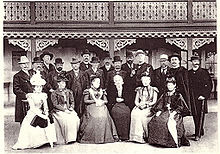Bureau International Permanent de la Paix
The Bureau International Permanent de la Paix , English International Peace Bureau , in German International Permanent Peace Office , is an organization that was founded at the 3rd Interparliamentary Conference of the Interparliamentary Union on November 13, 1891 in Rome to answer questions and make proposals for future peace conferences to work out. It was awarded the Nobel Peace Prize in 1910 for the commitment that this office carried out .
History and work
The association's intellectual fathers were the Danish MP Fredrik Bajer , the French journalist and professor of philosophy Charles Lemonier, and the British pacifist Hodgson Pratt . The main tasks of the organization were the organization and implementation of the international peace congresses, the propaganda for peace as well as the maintenance and coordination between pacifist groups, institutes and people. They formulated their principles on the basis of international law :
- The principle of the duties and morals of nations is the same as that of the morality and principles of individuals
- since no one has the right to practice vigilante justice, no state can declare war on another state.
- all differences between peoples must be resolved through legal channels.
- All peoples face each other as entities and, like individuals, have the right to legal defense.
- there is no right by conquest.
- the peoples have the inalienable and indispensable right to freely dispose of themselves.
- every nation's right to self-determination is inviolable.
The organization's first president until 1907 was Frederik Bajer, who in 1908 also received a Nobel Peace Prize as honorary president. Élie Ducommun became the first general secretary and received the Nobel Peace Prize in this role as early as 1902. The city of Bern in Switzerland was chosen as the seat of the organization and the annual general assembly was the highest decision-making body.
Ducommun carried on the official business until his death in 1906, his successor was the Swiss lawyer Charles Albert Gobat , who had received the Nobel Prize in 1902 as a representative of the Inter-Parliamentary Union together with Ducommun. With the outbreak of World War I in 1914, the organization began to experience a crisis, largely due to the suspension of funds by the Carnegie Foundation for International Peace . This founded a competing international peace office in Paris . When Gobat died in 1914, Henry Golay took over the business and tried to get the office out of the crisis. During the war, the office primarily supported the powers that be against Germany and Austria-Hungary, but it was only after the USA entered the war and the October Revolution in Russia that statements by the organization followed.
After the war, the office did not play a decisive role in peace policy . In 1924 the secretariat was moved to Geneva , but the number of participants in the organized conferences continued to decline and interest in working with other groups waned and did not increase again during the Second World War . Golay died in 1950 and the Peace Office was dissolved in the same year. In 1964 it was re-established as the International Peace Bureau . It is headed by Co-Presidents Lisa Clark and Reiner Braun .
literature
- Enrica Costa Bona: Le Bureau international de la paix et la Société des Nations . In: Marta Petricioli and Donatella Cherubini (eds.): Pour la paix en Europe. Institutions et société civil dans l'entre-deux-guerres. PIE Peter Lang, Brussels a. a. 2007, ISBN 978-90-5201-364-0 ( L'Europe et les Europes - 19e et 20e siècles . Volume 7), pp. 19-39.
- Helmut Mauermann: The International Peace Office 1892 to 1950. Silberburg Wissenschaft 284. Stuttgart 1990, ISBN 3-925344-78-0
Web links
- Information from the Nobel Foundation on the award ceremony in 1910 to the Bureau International Permanent de la Paix (English)
- Official website

